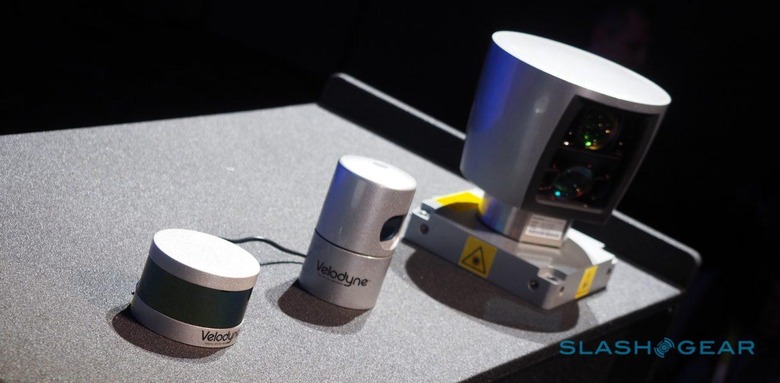Ford And Baidu Pump $150m Into Firm Giving Eyes To Autonomous Cars
Ford and Baidu have pumped $150m into Velodyne LiDAR, the sensor company specializing in the super-precise laser mapping systems many believe are vital to autonomous cars' success. Velodyne is responsible for the "turrets" most self-driving vehicles sprout from their roofs, each containing a laser array that can build up a 3D view of the world around them in real-time.
That precise mapping of the topography around the LiDAR sensor – including other vehicles, pedestrians, cyclists, buildings, and other aspects – then allows the autonomous vehicle to make smarter judgements than from radar or camera-based systems alone.
In fact, Velodyne's current models are capable of generating 300K to 2.2 million data points per second, the company says, with a range up to 200 meters at centimeter-level accuracy.
None of that comes cheap, though, with LiDAR sensors one of the most expensive parts of any autonomous vehicle. With each potentially adding around $80k to the bill-of-materials, and at least two required per car – if not more – it effectively prices the technology out of the consumer market today.
In fact, alternatives to LiDAR have already sprung up with the promise of far cheaper components and similar performance, though commercial success is still some way off.

Ford renewed its commitment to Velodyne's technology back in January, announcing that its expanding fleet of self-driving cars would use the company's newest, even smaller solid-state model. The automaker said it was targeting first Level 4, then Level 5 autonomy.
Now, with a joint investment in the sensor maker – along with Baidu, the Chinese search engine giant that is also developing its own self-driving technology – the hope is that future LiDAR sensors can be even smaller and cheaper.
"The investment will allow Velodyne to rapidly expand the design and production of high performance, cost effective automotive LiDAR sensors," Velodyne said today, "accelerating mass adoption in autonomous vehicle and ADAS applications and therefore accelerating the critical, transformative benefits they provide."
Meanwhile, as self-driving vehicles become more commonplace, Velodyne says it plans to add two "independent industry executives" to its board to help advise. It's yet to name who those people will be.
Most recently, Ford used LiDAR sensors in tandem with a much cheaper camera-vision system in an autonomous EV project that could move electric shuttles around an MIT campus in response to demand.
